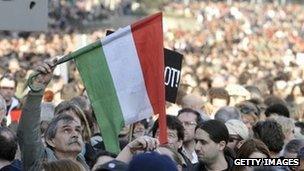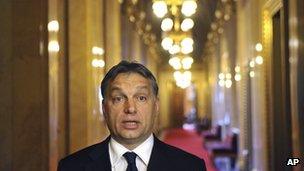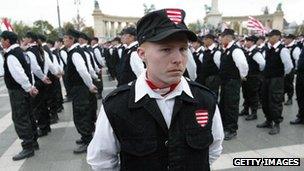Hungarians despair of political class
- Published

The new Orban government has faced mass protests over its controversial constitutional reforms
Until recently, Hungary was deeply divided.
Half of the population believed that only the socialists could be trusted to run the country's affairs competently. They despised the current Prime Minister, Viktor Orban, as a populist demagogue.
Meanwhile, the other half saw Mr Orban as a saviour from the corruption of the socialists, who were seen as a bunch of detestable self-serving ex-communist apparatchiks in new suits.
But now the country is becoming more united again - united in despair at the entire political class.
Political divide
A socialist-led coalition ran Hungary for eight years, until they were booted out of office at elections in 2010.
Their record during that period left much to be desired.
The first Prime Minister, Peter Medgyessy, was accused by the outgoing Mr Orban of having won the 2002 elections with the help of ballot-rigging. The ballots were destroyed without being recounted.
The confrontation, which spilled into the street, echoed the stand-off between George W Bush and Al Gore of 2000, and left many Hungarian friends and family, who found themselves on opposite sides of the political divide, no longer on speaking terms.
Shortly afterwards, Mr Medgyessy was exposed as having been a spy under the old communist regime. Eventually - after a string of gaffes and petty scandals - he was forced out mid-term by his own colleagues.
His successor, Ferenc Gyurcsany - a wealthy businessman - went on to win a second term for the socialists in 2006.
Except that, shortly after the elections, a tape was leaked to the press in which Mr Gyurcsany told party loyalists the government had "lied for the last year-and-a-half" to retain power, external.
More protests - and riots - ensued.
Debt
The main "lie" concerned the state of the government's finances.
Long before it became fashionable in Europe, Hungary's socialists had turned a fiscal mess - inherited from Mr Orban - into a nightmare.
Chronic tax evasion combined with rising and often wasteful spending to inflate the government's borrowing to 9.3% of the country's entire economic output by the 2006 election year.

Mr Orban has become an even more divisive figure since returning to the corridors of power
Meanwhile, the government tried to play games with its borrowing statistics.
For example it tried, and failed, to convince Eurostat, the European statistics agency, that the cost of building motorways - which was puzzlingly high for a country that is mostly rural and flat as a pancake - should not be included in its borrowing statistics.
And the scandals didn't stop - politicians and their friends were accused of siphoning off public funds left, right and centre.
But the biggest damage done during this period was the failure to spot the problems building up in the banking system.
Hungarian homebuyers had been increasingly taking out loans in foreign currency - particularly Swiss francs - because the interest rate was so much lower than in their own currency.
The banks - most of them Austrian- or Italian-owned - were happy for this growing business line.
They thought they had hedged the currency risk. But they forgot about the credit risk.
Following the 2008 global financial crisis, the Hungarian forint fell and fell.
The Swiss franc has gained more than 80% against the forint - and people's mortgage payments have risen in tandem, leaving many unable to repay their debts.
That put the banks in trouble, and with the coming of the global financial crisis in 2008, the socialists were forced to go cap-in-hand to the International Monetary Fund to beg for a rescue.
Bank bashing
Eventually, in 2009, Mr Gyurcsany was also ousted in another socialist party coup, but to no avail.
The following year, Mr Orban romped back to power with a two-thirds parliamentary majority.
He has since followed the Sinatra doctrine, and sought to do things his way.
He repaid the bailout loans and, free of the IMF's strictures, his government then passed a law allowing mortgage borrowers to convert their debts back into Hungarian forints at the old exchange rate, leaving the banks to eat the currency losses.
He also introduced a new windfall tax on the banks.
The banks, or their foreign owners, have retaliated by slashing lending to the country - something they probably would have done anyway in response to the financial crisis.
Austria has ordered its banks only to increase their foreign lending in Hungary and other countries, if it is matched by new local deposits.
That threatens to push Hungary's economy into a nasty recession.
What's more, the lending drought has hurt the government itself, which has found it increasingly difficult and expensive to borrow in its own currency.
Its 10-year cost of borrowing currently hovers around 10%, external.
In part, this reflects another policy of the government. The parliament has passed a new law that the European Central Bank, external, among others, claims harms the Hungarian central bank's independence.
That has added further to the government's borrowing costs, as lenders fear inflation will no longer be kept in check.
The renewed financial crisis has forced Mr Orban reluctantly back into the hands of the IMF and the EU, asking for a new standby facility to bolster the economy.
But Hungary's would-be rescuers are playing hardball, and walked out of talks in December over the new central bank law.
Checks and balances
In any case, the central bank is arguably only a sideshow.
For Mr Orban has used his two-thirds super-majority in parliament to push through an entire new constitution that has been attacked for undermining the country's democracy, external.
Critics say the new constitution has:
gerrymandered parliamentary constituencies to give the governing party a majority
removed opposition party representation from the electoral commission
curtailed the powers of the constitutional court and the judiciary
packed the judiciary with its own appointees
set up a new budget watchdog that can block future governments' legislation
set up another new watchdog, staffed by its own people, to ensure "balance" in the media
lengthened the terms of many of Mr Orban's political appointees to key positions and made it harder for future governments to replace them
A storm may be brewing in Brussels, where there are mutterings about the Copenhagen criteria - the commitment to democracy, among other things, that is a prerequisite of European Union membership.
Undecided

The ultra-right Jobbik has its own paramilitary wing
But most worrying is the reaction of ordinary Hungarians.
Support for Mr Orban's Fidesz party has plummeted to only 20% of eligible voters as the recession has worsened and protesters are on the streets yet again.
But support for the socialists has not recovered.
A youth protest movement - "Politics can be different" - briefly took off last year, but has since lost momentum.
The extremist Jobbik - "Right-ists" or "Betters" (it's the same word) - have done best, overtaking the socialists in the polls, external to become the most popular opposition force, albeit with only 10% support.
The group is anti-Semitic and anti-Roma, and has its own paramilitary wing.
But the biggest beneficiary in the polls has been "don't know" and "wouldn't say".
Or should that be "none of the above"?